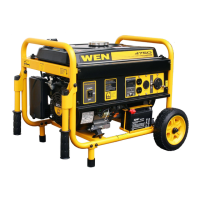STARTING THE GENERATOR
Before starting the generator, make sure you have read and performed the steps in the “Generator Preparation” sec-
tion of this manual. If you are unsure about how to perform any of the steps in this manual please call
1-(800) 232-1195 M-F 8-5 CST for customer service.
DANGER! CARBON MONOXIDE - USING A GENERATOR INDOORS CAN KILL YOU IN MINUTES.
Using a generator indoors CAN KILL YOU IN MINUTES. Generator exhaust contains carbon monoxide (CO). This
is a poison gas you cannot see or smell. If you can smell the generator exhaust, you are breathing CO. But even
if you cannot smell the exhaust, you could be breathing CO.
NEVER use a generator inside homes, garages, crawl spaces, or other partially enclosed areas. Deadly levels
of carbon monoxide can build up in these areas. Using a fan or opening windows and doors does NOT supply
enough fresh air. ONLY use a generator outside and far away from windows, doors, and vents. These openings
can pull in generator exhaust.
Even if you use a generator correctly, CO may leak into the home. ALWAYS use a battery-powered or battery-
backup CO alarm in the home. If you start to feel sick, dizzy, or weak after the generator has been running, move
to fresh air RIGHT AWAY. See a doctor. You may have carbon monoxide poisoning.
WARNING! The exhaust from this product contains chemicals known to the State of California to cause
cancer, birth defects, or other reproductive harm.
WARNING! This generator may emit highly flammable and explosive gasoline vapors, which can cause se-
vere burns or even death if ignited. A nearby open flame can lead to explosion even if it isn’t directly in contact
with gasoline.
WARNING! This generator produces powerful voltage, which can result in electrocution.
ALWAYS ground the generator before using it (see the “Ground the Generator” portion of the “Generator Prepara-
tion” section).
Generator should only be plugged into electrical devices, either directly or with an extension cord. NEVER connect to
a building electrical system without a qualified electrician. Such connections must comply with local electrical laws
and codes. Failure to comply can create a back-feed, which may result in serious injury or death to utility workers.
Use a ground fault circuit interrupter (GFCI) in highly conductive areas such as metal decking or steel work. GFCIs
are available in-line with some extension cords.
Do not use in rainy or wet conditions. Do not touch bare wires or receptacles (outlets). Do not allow children or
non-qualified persons to operate.
CAUTION! Disconnect all electrical loads from the generator before attempting to start or stop.
17

